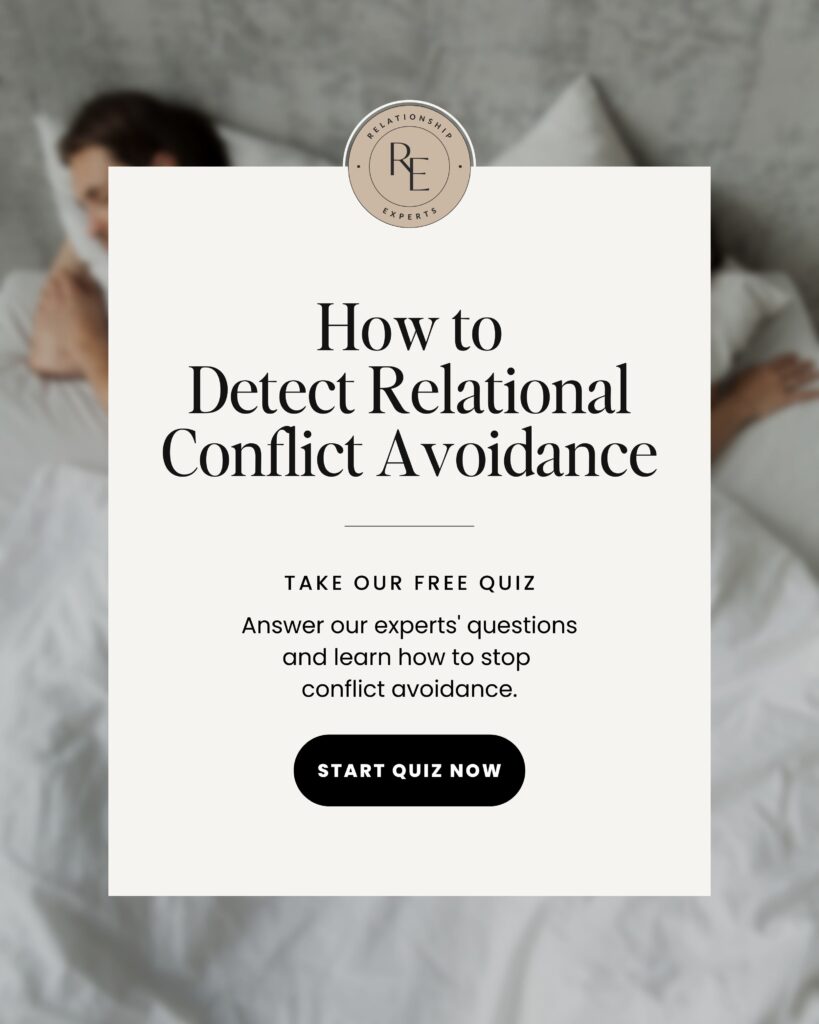You don’t want to miss this article. In fact, I can’t believe we haven’t talked about this before. Why? Because this topic is too important to skip. What I’m about to share with you has a way of hiding in the shadows of too many relationships…
First, you probably know that infidelity happens for all kinds of reasons. Sometimes it has to do with the relationship, sometimes it doesn’t. Sometimes it’s a combination of both. What you might not know is that, in the majority of cases, there is a “silent killer” lurking between partners for months, even years before infidelity ever happens.
It’s called conflict avoidance.
How does something this destructive go undetected? Because it feels natural, even good at times. Yet, it has the power to gradually and quietly disconnect partners completely.
Fortunately, your relationship is not at the unavoidable mercy of this hidden relationship problem. I’m here to help you understand what conflict avoidance is, what it does, and how you can stop it.
Conflict Avoidance: What It Is & Why It Happens So Often
Lately, I’ve been doing a little relationship research. I’ve been asking couples interviewing for our infidelity recovery program to describe what their relationship was like before infidelity. The answers vary, but one element keeps coming up repeatedly. Though they describe their prior relationship as good, strong, full of respect, healthy, etc, they add that communication was missing.
Strange? Right? You’d expect that couples who describe their relationship as good and healthy would also feel good about their communication.
Not so! Societally, we’ve fostered the belief that no fighting or arguing is good for our relationships. We measure health in modern relationships through one lens: confrontation.
Think about it. Ask yourself and your friends, “is confrontation good in relationships?” Most will say no. This is not entirely wrong. However, do you know what’s worse? Avoidance.
After all, for many years now, we’ve taught our children not to be confrontational. We send the message that “if you don’t have anything good to say – don’t say anything.” I think we did this mostly with men. A confrontational man is seen as aggressive and modern relationships don’t tolerate aggression very well.
So, how have we learned to interact as a result? We keep things to ourselves. Especially if
- it’s negative
- it’s a complaint
- we’re vulnerable.
Why are we so good at keeping these things to ourselves?
Because
- we think it’s just going to turn into another argument
- we’re not going to feel heard or understood
- we fear we might seem crazy/irrational/sick/etc.
Most couples experience some level of conflict avoidance prior to infidelity.
Knowingly or not, conflict avoidance causes a disconnect. One or both partners stop sharing on a deeper, more vulnerable level. They start keeping things to themselves.
What happens when you get used to keeping things to yourself? Shirley Glass says in her book, “Not Just Friends”, that it becomes easier to harbor more secrecy. She’s right.
But, sadly, that is not all. When you feel like you can’t share on deeper levels (eg. complaints about the relationship, outside stressors, dreams aspirations) you sentence your relationship to a superficial connection, just to keep the peace.
Why It Is Essential to Stop Conflict Avoidance to Heal & Build Trust After Infidelity
According to the majority of studies about healing after infidelity, no healing can start before the pain is heard. This is why ending conflict avoidance is one of the first steps we take with couples in our infidelity recovery program. We guide our couples through hearing the pain in a very different way than they likely have before.
Additionally, healing cannot continue if the couple will not make it comfortable to be vulnerable with each other. Those are two very important words: comfortable and vulnerable. Essentially, I’m asking you to become more comfortable with vulnerability. Not as a one-sided offering, but as a joint effort.
When one becomes more vulnerable, the other makes it comfortable. And when one makes it comfortable, the other can become more vulnerable. This is the essence of relational healing. One is nourished by the other in a beautiful endless cycle.
What does this healing look like for couples?
Couples start with hearing the pain of the hurt partner and allowing healing conversations to happen around it. Then, once it’s safer to be vulnerable, the unfaithful partner can open a deeper channel and offer new access to their inner psychological world to the hurt partner.
This will help complete a new cycle of deep-level communication that can continue and replace conflict avoidance. When our infidelity program couples reach this stage in the process, there are often tears from them and tears from me. These are tears of release, joy, and, most importantly, safe vulnerability that did not exist in the relationship for a long time.
Doesn’t it take years to change conflict-avoidant cycles?
Neuroscience studies prove that isn’t the case at all. We can change behaviors and cycles in a matter of hours thanks to neural plasticity. What we used to think will take years to change, is now shown to modify in hours.
In his research, relationship expert John Gottman found too that couples who are successful in their relationships have more instances of “turning towards” bids for connection.
A bid for connection may be simply reaching out for a hug but it can also be sharing a complaint about the relationship. Turning towards that bid simply means that the receiving partner reacts in a positive way. They acknowledge their partner’s feelings, validate them, and possibly commit to making the situation better.
This is one of the most important components of happy fulfilling relationships. Turning towards bids for connection makes both partners feel bonded and connected.
So, Vulnerability, Bids for connection, and Turning Towards Them Matter…Now, what?
- Identify what you’re doing and become more aware.
If you suspect that this destructive habit is at play in your relationship, you aren’t alone. Use our free quiz below to identify relational conflict avoidance now.
2. Change the cycle of avoidance.
-
- For example, when you feel unloved and unattractive, say something to your partner about it. This is a bid for connection.
- If your partner ignores you, reacts defensively, denies your feelings, or starts an argument, they are turning against that bid for connection.
- Constant arguments create exhaustion and start conflict avoidance. And you know where that leads.
- So, be sure to turn toward your spouse’s bid for connection to support the health and depth of your relationship.
Read more about that here: How to Turn Toward Your Partner, Not Away
Next Steps
I hope this article was helpful to you! I truly believe this information can help you start healing your relationship from a place of understanding. However, if you feel you’d like more guidance, you’re not alone. We’ve worked with hundreds of couples and would love to work with you. Let’s talk more about it soon.
For further help and support, please:
- Take our Relational Conflict Avoidance Self Check quiz.
- Visit our page regarding Infidelity Recovery. to learn about our effective programs.
- Schedule a free in-depth consultation with me or my team.
Heading



